Just like we are all different from the outside, similarly, we all have different types of thinking from each other. Our brains may look the same, but the way of using them is different for everyone. Different types of thinking in psychology make different types of thinkers. Just like everyone has a computer, someone becomes Bill Gates, and Mark Zuckerberg by using it and some consider it to be just a means of entertainment. What makes the difference between extraordinary and ordinary is their thinking process.
There is the thinking that makes your identity. Despite the different thinking processes of all people, there are the 7 most common types of thinkers in psychology.
What are the 7 Most Common Types of Thinkers?
There are different ways to categorize types of thinkers based on their thinking patterns and cognitive styles. There are 7 different types of thinkers or types of thinking in psychology:

1. Creative Thinkers
Ability to embrace new and innovative ideas breaking from established ideas, principles, rules, and procedures. People who use this thinking often hear that they “think outside the box”.
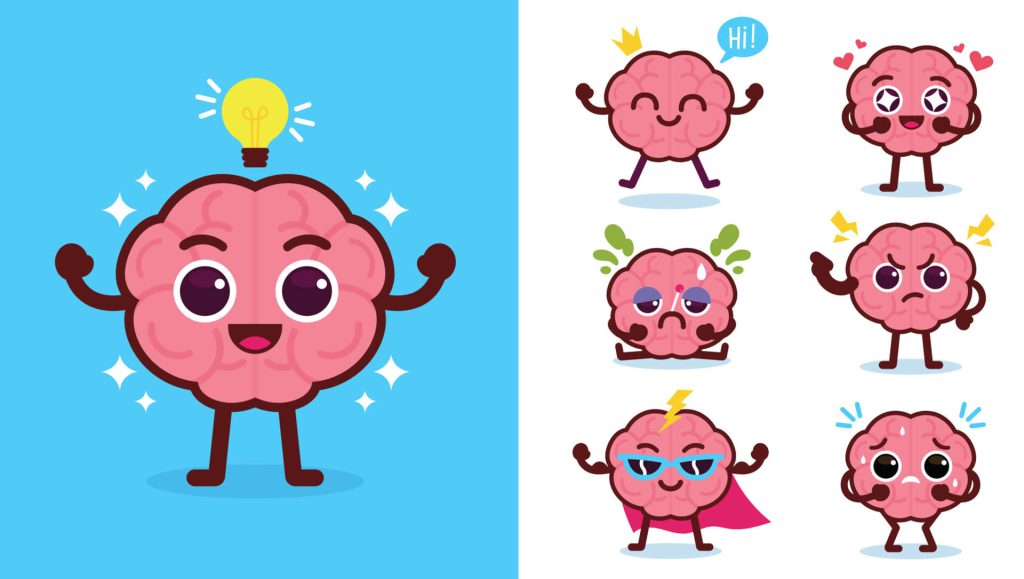
Creative-minded people think of developing innovative solutions to all problems. Creative thinkers not only consider a large number of ideas but also have a variety and range of them.
Once they’ve settled on their ideas, creative thinkers will experiment with them. They look at ideas from multiple perspectives and test how their solutions fit within the framework of what is working. Creative thinkers are not afraid to take risks and try new ideas. In fact, this ability to develop, test and implement original solutions makes them a valuable asset to almost any workplace.
- Conducting an interactive brainstorming to collect initial ideas on a project
- Evaluating an existing process and making suggestions on how to improve it
- Researching other ways to market a product and experimenting with new marketing channels
- Develop an innovative way to reach potential customers
- Identifying a unique opportunity to promote the company’s brand and developing a strategy for doing so
The 5 Types of Creative Thinkers
If seen, there is a creative genius inside all of us. Creativity is measured in several unique ways, similar to Howard Gardner’s theory of multiple intelligences. This means that everyone’s creative thinking works differently for everyone. There are different types of thinking. Are you wondering how is your creative thinking?
There are 5 types of creative thinkers.
1. Lateral Thinkers
This is probably the most common type people think of when they first hear the word “creativity.” Lateral thinkers tend to think outside the box generating new ideas rather than working with what is already familiar. Lateral thinking is great for innovations, inventions, and problem-solving. People who identify with this type usually aren’t afraid to leave tradition behind to play with new patterns.
2. Inspirational Thinkers
Do random thoughts ever suddenly come to you? This is called motivational thinking. Inspirational thinking usually comes spontaneously, quickly, and out of nowhere. Researchers call these breakthroughs high creativity. Often people who come up with inspiring ideas first see them in their dreams but can experience them while awake. During this creative process, the individual undergoes a life-changing revelation that elevates their skills and talents to ‘another level’.
3. Divergent Thinkers
American psychologist JP Guilford coined the terms divergent thinking and convergent thinking. Guilford proposed that these two types of thinking are opposite to each other. While convergent thinking involves focusing on only one idea or one solution, divergent thinking involves a more flexible approach where multiple solutions and options are explored. People who identify as divergent thinkers often brainstorm and enjoy taking risks to explore other options.
4. The Systems Thinker
Do you have the skills to connect the dots? People who identify as systemic thinkers are good at understanding how things relate to each other when they look at systems. This type of thinker is often considered a managerial genius because they are great at organizing and establishing rules and regulations for smooth operations.
5. Aesthetic Thinker
Aesthetic thinking involves creating or creating things that are pleasing to our senses. A person may have strong visual and spatial skills to go into careers such as architecture, painting, and drawing.
Estimative thinkers also flourish in the music industry where they are skilled at creating rhythms, beats, and melodies that all blend harmoniously together. Writers, scientists, and mathematicians all fall under this creative branch. There are many aesthetic thinkers like our animators, screenwriters, and storytellers who work hard every day to create the best content for you. What Kind of Creative Thinker Are You?
2. Analytical Thinkers
The ability to separate a whole into its basic parts to examine the parts and their relationships. People with this type of thinking are great problem-solvers and have a structured and systematic way of doing things.
An analytical thinker is the type of person who views problems as puzzles that are solvable through research and evaluation. They use mathematical, scientific, or social principles to influence their decision-making. Analytical people weigh the pros and cons and consult data to inform their choices.
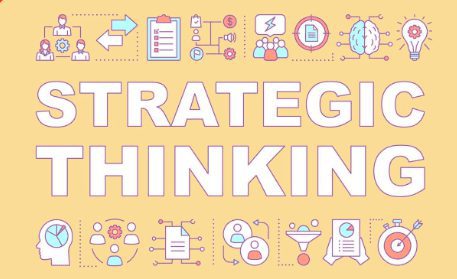
Analytical thinkers think in a logical way where they dive deep into a topic. When they are making decisions, they make them based on a thorough examination of facts and information rather than on emotion.
Thus for complex decisions, they take their time and process any information to make the most optimal decision.
If others are only looking at something superficially, analytical thinkers will probably dig a step further to uncover the patterns and principles underpinning the concept.
This is because analytical thinkers have one major habit that their children have in common which is an endless curiosity to know more about things.
3. Critical Thinkers
The process of careful evaluation or decision-making. Critical thinkers do this to determine the authenticity, accuracy, value, validity, or value of something. Instead of strictly breaking down information into parts, critical thinkers explore other elements that could have influenced the conclusion.

4. Concrete Thinkers
More often than not, this type of thinker prefers to think, understand, and apply factual knowledge. It is about thinking of objects or ideas as specific objects rather than as a theoretical representation of a general concept. It involves only practical thinking, always literal and to the point.

5. Abstract Thinkers
The ability to associate seemingly random things with each other and make connections that are difficult for others to see. People with this type of thinking focus on the hidden meanings behind things related to other objects, events, or experiences. Abstract thinkers can generally see things as principles and/or possibilities.

Abstract thinkers are individuals who excel at thinking conceptually and creatively, often focusing on abstract ideas, theories, and possibilities rather than concrete, tangible objects or situations. They have a natural inclination towards thinking beyond the surface level and exploring deeper meanings and connections.
Characteristics of abstract thinkers include:
- Conceptual Thinking: Abstract thinkers can grasp complex concepts and understand the underlying principles or theories behind them. They enjoy exploring abstract ideas and theoretical frameworks.
- Creativity and Imagination: They have a rich imagination and are often drawn to artistic, philosophical, or theoretical pursuits. They can generate novel ideas and make unique connections between seemingly unrelated concepts.
- Symbolic and Metaphorical Thinking: Abstract thinkers often use symbols, metaphors, and analogies to represent and understand abstract concepts. They can find meaning in symbolic representations and explore different layers of interpretation.
- Non-Linear Thinking: They don’t adhere strictly to linear, sequential thought processes. Instead, they tend to make intuitive leaps and explore non-linear connections between ideas.
- Reflective and Contemplative: Abstract thinkers are introspective and enjoy deep reflection and contemplation. They may spend time exploring their own thoughts, feelings, and perceptions, seeking insights and understanding.
- Comfort with Ambiguity: They are comfortable with uncertainty and ambiguity, and they can navigate complex or abstract concepts without needing clear-cut answers or definitive solutions.
Abstract thinking is valuable in fields such as philosophy, mathematics, art, and scientific research, where the ability to think conceptually and explore abstract ideas is essential. However, it’s important to note that abstract thinkers may also benefit from developing practical and concrete thinking skills to balance their thought processes and effectively apply their ideas in real-world contexts.
6. Divergent Thinkers
This mindset leads to an infinite number of solutions to find an effective solution. So, instead of starting with a fixed number of possibilities and converging on an answer, divergent thinkers go as far as possible and move outwards in search of solutions.
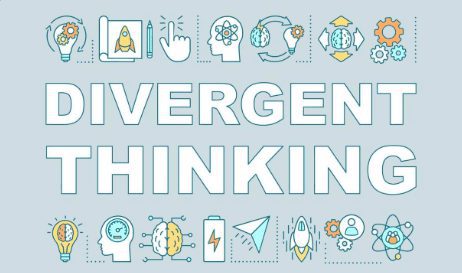
Let’s start by talking about divergent thinking. When you think of “brainstorming,” you are thinking of divergent thinking. This type of thinking requires you to expand your mind and find innovative solutions. the possibilities are endless. Out-of-the-box thinking allows you to look at materials and products in new and different ways.
Mind maps are the best way to put the results of divergent thinking on paper. Mind maps have ideas that branch off from each other in different directions. There’s no need to use much logic when you’re in “opposite thinking” mode. Remember, you are expanding what is possible, not limiting it.
7. Convergent Thinkers
The process of combining a finite number of perspectives or ideas to find a single solution. Convergent thinkers will target these possibilities, or converge them inward, to come up with a solution.
Treat it as a multiple-choice question in an exam. You have four possible answers but only one is correct. To solve the problem, you would use convergent thinking.
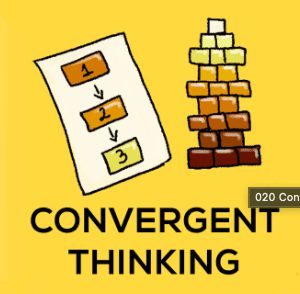
Now, let’s go back to the first example. Divergent thinking was happening – everyone was coming up with an “out of the box” idea. But they were falling down fast. The person who was critiquing his argument was in “convergent thinking” mode.
Convergent thinking is not bad or unproductive. It is important! This process is more analytical and “realistic”. It uses logic to narrow down ideas. This part of the thinking process requires looking for confusion and potential problems.
Now, as we’ve explored the 7 most common types of thinkers, let us identify your personal thinking style and learn how you can make the most of it.
Some More Types of Thinkers
Strategic Thinkers
Strategic thinkers have a big-picture perspective and excel at long-term planning and goal-setting. They can anticipate potential obstacles and devise effective strategies to achieve desired outcomes.

Systems Thinkers
Systems thinkers have a holistic view of complex systems and understand how individual components interact to create larger patterns. They can identify the interdependencies and feedback loops within a system.
Intuitive Thinkers
Intuitive thinkers rely on their gut feelings and instincts to make decisions. They have a deep sense of knowing and can quickly grasp complex concepts without necessarily being able to explain the reasoning behind them.
Intuitive thinkers are individuals who rely on their instincts, gut feelings, and inner guidance when making decisions and understanding the world around them. They have a natural inclination towards perceiving patterns, recognizing possibilities, and making quick connections without relying heavily on logical analysis or extensive reasoning.

Characteristics of intuitive thinkers include:
- Gut Instincts: Intuitive thinkers trust their instincts and rely on their “gut feelings” when making decisions. They have a strong sense of inner knowing and can quickly assess a situation or person without needing to analyze all the details.
- Pattern Recognition: They excel at recognizing patterns and making connections between seemingly unrelated information. They can quickly grasp the essence of a situation or problem and identify underlying themes or trends.
- Big-Picture Thinking: Intuitive thinkers tend to focus on the bigger picture rather than getting lost in the details. They can see the broader implications and possibilities of a situation and are skilled at understanding the overall context.
- Creative Problem-Solving: They often come up with innovative and creative solutions to problems. Their ability to think outside the box allows them to generate unique ideas and approaches that others may not have considered.
- Holistic Understanding: Intuitive thinkers have a holistic understanding of complex systems and concepts. They can grasp the interconnectedness of various elements and consider multiple factors simultaneously.
- Rapid Decision-Making: They can make decisions quickly and trust their intuition to guide them. They have a natural ability to assess situations and people, which enables them to make snap judgments with a high level of accuracy.
Intuitive thinking is valuable in fields such as entrepreneurship, leadership, and creative pursuits, where the ability to trust one’s instincts and think beyond conventional boundaries can lead to breakthrough ideas and innovative solutions. However, it’s important for intuitive thinkers to also develop critical thinking skills and consider logical analysis when needed to ensure well-informed decision-making.
Reflective Thinkers
Reflective thinkers are introspective and contemplative. They engage in deep self-reflection, analyzing their thoughts, beliefs, and experiences to gain insights and personal growth.
Reflective thinkers are individuals who engage in deep introspection, careful analysis, and critical evaluation of information and ideas. They have a thoughtful and deliberate approach to thinking, preferring to examine and question assumptions, consider different perspectives, and weigh the evidence before forming conclusions or making decisions.

Characteristics of reflective thinkers include:
- Thoughtful Analysis: Reflective thinkers take the time to carefully analyze information, ideas, and experiences. They engage in critical thinking, examining the underlying assumptions, biases, and evidence related to a particular topic or problem.
- Self-Reflection: They engage in introspection and self-reflection, examining their own thoughts, beliefs, and experiences. They seek to understand their own biases, emotions, and motivations, and how these factors influence their thinking.
- Open-mindedness: Reflective thinkers have an open mind and are willing to consider multiple perspectives and alternative viewpoints. They recognize the value of diverse opinions and seek to understand different ways of thinking before forming judgments.
- Questioning and Curiosity: They have a natural inclination to question assumptions, seek clarification, and explore deeper meanings. They ask probing questions to gain a deeper understanding of complex issues and challenge conventional wisdom.
- Deliberate Decision-Making: Reflective thinkers take their time when making decisions. They carefully weigh the pros and cons, consider potential consequences, and evaluate different options before arriving at a conclusion.
- Continuous Learning: They have a strong desire for ongoing learning and personal growth. They actively seek out new knowledge, engage in self-education, and strive to expand their understanding of various subjects.
- Self-awareness: Reflective thinkers have a high level of self-awareness and emotional intelligence. They understand their own strengths, weaknesses, and biases, and actively work on personal development.
Reflective thinking is valuable in many areas, such as academia, research, problem-solving, and decision-making. It helps individuals gain deeper insights, make well-informed choices, and develop a more nuanced understanding of complex issues. By critically examining their own thinking and engaging in reflective practices, individuals can improve their cognitive abilities and enhance their overall intellectual and personal growth.
It’s important to note that these categories are not mutually exclusive, and individuals can exhibit traits from multiple types of thinking. People’s thinking styles can also vary depending on the context and situation. Additionally, these categories are oversimplifications, and individuals often possess a combination of different thinking styles.
What Impact Your Thinking Process?
Your surroundings and social environment play a very important role in your thinking process. As you see a child he learns everything from his surrounding people same his thinking also becomes accordingly. If a baby takes birth in English speaking he will learn English automatically, same as a baby takes birth in a French family he will learn French automatically. It also applies to the concept of thinking.

If a child took birth into a poor family you will his thinking process will be limited. But on the other hand, if a child took birth into a rich family, you will find his thinking process accordingly. That’s the reason in many cases a son or daughter of the artist becomes an artist, a professional becomes a professional, a sportsman becomes a sportsman, and a business becomes business.
Your association with people also affects your thinking style. Perhaps you have heard a story that once by mistake, the lion’s child started living among the dogs by mistake. As he grew up his thinking also became like that of a dog. Dog-like behavior was seen in his behavior. Because he started living in the middle of dogs.
When you change your association then your thinking starts changing automatically. You will feel the change in your behavior, your mindset, your talk, in your walk. You will find a different you.
What Types of Thinking Do You Identify With?
We need to understand how our brain works so that we can make our brain work in a better way.
Would you describe yourself as a logical or creative person? Are you rational or do you prefer to think in abstract terms? Research shows that the kind of thinking you adopt has an impact on the kind of person you become.
To identify which thinking styles or thinking preferences you associate with I made a Thinking Style Test that is also known as a psychometric test or brain dominance test. That is basically based on the Split-brain theory.
Thinking Styles Test
This test is basically based on the split-brain theory that says our brain is divided into two hemispheres – The Left Brain and the Right Brain. Each hemisphere has a different style. As the left brain is the Analytical brain and the right brain is the creative brain.
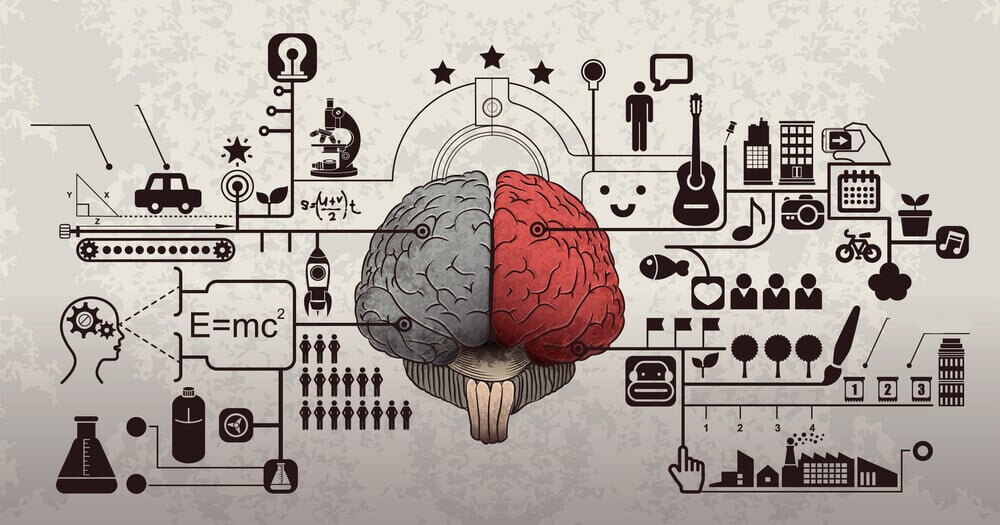
Further, both hemispheres are divided into four-part – upper left brain, lower left brain, and upper right brain, lower right brain.
This test has two assessments with 20 and 8 questions each related to presenting your attitudes and your interests.
Click on Psychometric Test to know more about the test.
Love,
Saurabh Goel
Read more blogs on How To Master The Art Of Thinking? Positive Thoughts – How to keep your thoughts positive? | Mental Health Tips, How to Detox Your Mind? Glossary of Mental Health Terms – Different Types of Mental Disorders
Saurabh Goel
He is the Founder and CEO of the Training and Counselling Company ‘Brain Soul & You’. He is an NLP Wellness Coach, Life Coach, Brain analyst, and Trainer for Education, Corporate, and Entrepreneurship. For more than 7 years, he delivered presentations on entrepreneurship, mind programming, and motivation. He did his B.tech in IT and later choose to be a successful psychologist. He is helping people in various ways through his counseling and training sessions.

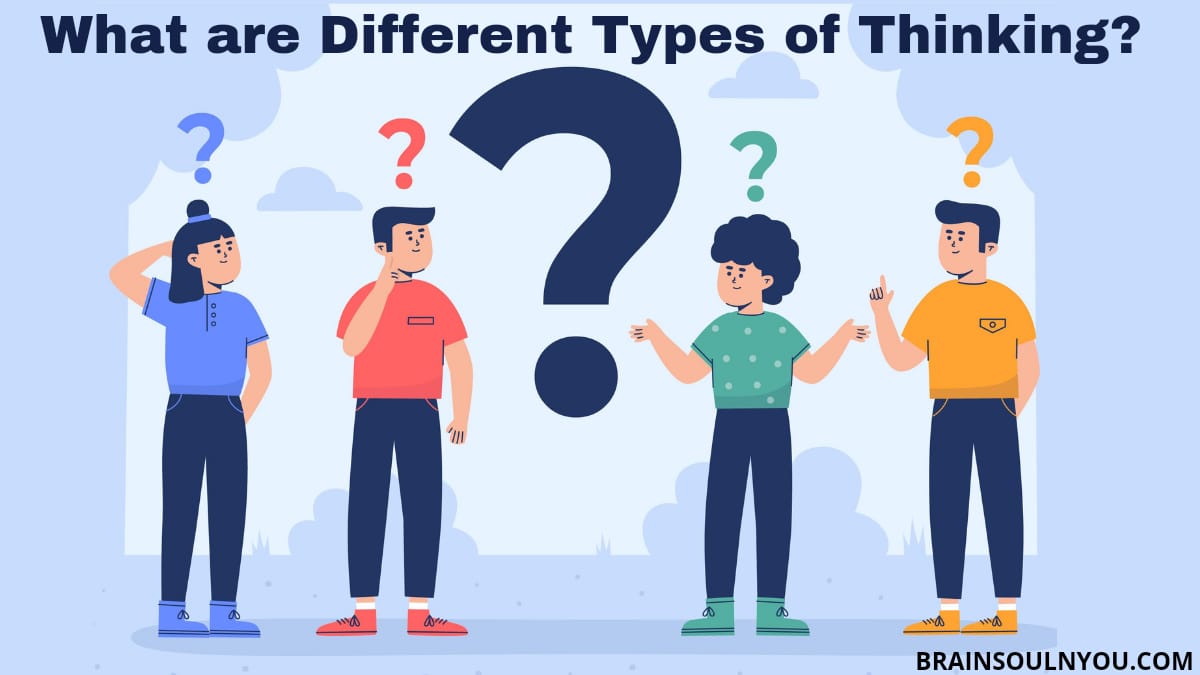

upuxz1
vczq3e
gfh2fl
grqltc